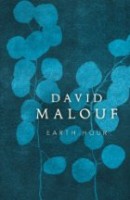DavidMalouf. Earth Hour (UQP 2014)
 As I was reading Clive James’s translation of Dante’s Purgatorio recently, one of my unexpected small pleasures was the occasional recognition of a place name. ‘Fiesole – that’s Anny’s town!’ I would exclaim under my breath, or ‘Campagnatico – isn’t that where David Malouf used to live?’ My pleasure comes from my North Queensland provenance: if you live in New York, Paris or even Sydney, you’re forever walking down streets that have appeared in poems, novels, movies; if you’re from Innisfail, North Queensland, not so much. My Purgatorio moments weren’t completely without wider usefulness, of course, as they gave me a whiff of how Dante’s contemporaries would have read the poem: they knew all the places he mentions, and had a wealth of personal associations with them. Any personal connection a modern reader has is a pale shadow, but a shadow all the same.
As I was reading Clive James’s translation of Dante’s Purgatorio recently, one of my unexpected small pleasures was the occasional recognition of a place name. ‘Fiesole – that’s Anny’s town!’ I would exclaim under my breath, or ‘Campagnatico – isn’t that where David Malouf used to live?’ My pleasure comes from my North Queensland provenance: if you live in New York, Paris or even Sydney, you’re forever walking down streets that have appeared in poems, novels, movies; if you’re from Innisfail, North Queensland, not so much. My Purgatorio moments weren’t completely without wider usefulness, of course, as they gave me a whiff of how Dante’s contemporaries would have read the poem: they knew all the places he mentions, and had a wealth of personal associations with them. Any personal connection a modern reader has is a pale shadow, but a shadow all the same.
The shoe was on the other foot as I read the poems in Earth Hour. The poetry may address what they used to call universal themes (do they still call them that?), but it often addresses them as they arise in places I know, and nowhere more dramatically than in ‘At Laterina’. For a start, the poem is dedicated ‘For Jeffrey Smart (1921–2013)’: I know who Jeffrey Smart is, I know his portrait of David Malouf as petrol pump attendant, and what’s more I have fond memories of him as Phidias, the artist on the ABC Children’s Hour of my childhood, all of which may not add to an understanding of the poem, but it does add to my sense of connection with it. The poem meditates on the passage of time in an Italian village (‘Centuries pass / unnoticed here; it’s days that are tedious’), and moves on to the ‘sweet loaded breath’ of the tiglio in bloom. I’m engaged enough to find out that tiglio is lime tree. Then:
__________________Was it always
like this? Did native sons high on a scaffold
in Piedmont, streaked with smuts in a smoky canefield
near Innisfail, North Queensland, feel the planet
shrink in their memory of it, the streets, the decades
one as each June makes them when we catch
on a gust of heated air, as at a key-change,
its green, original fragrance?
I certainly feel the planet shrink, and in a good way.
There’s so much to love in this book: renderings of Horace, Heine and Baudelaire that range from elegant close translation to wildly divergent variations on the originals’ theme [Added later – not as divergent as I thought once I had the right Baudelaire poem – see Brendan Doyle’s comment below]; meditations on deep time, on what it means to be human, on our effect on the planet; profound pieces on ageing and mortality. I’m not able to do much more than name some of the poems that I am deeply grateful for: ‘Whistling in the Dark’ (‘Seeking a mind in the machine, and in constellations’), ‘A Green Miscellany’ (‘No, not nature but a green / miscellany, our years-in-the-making masterpiece’), ‘Touching the Earth’ (about worms), ‘Long Story Short’ (reminiscent of Blake’s ‘A Poison Tree’), ‘Persimmons: Campagnatico’ (about trees bearing fruit at the end of winter), ‘Nightsong, Nightlong’ (about a bird, and a heart), ‘Eternal Moment at Poggio Madonna’ (about a sleeping cat). That will have to do.
David Malouf turned 80 recently, and was celebrated on the show that has replaced Ramona Koval’s Book Show on the ABC. You can hear an excellent interview with Michael Cathcart here, and a discussion of his work here, by a panel comprising Ivor Indyk, academic Yvonne Smith, and poet Jaya Savige.
Finally, as a service to any drop-in readers looking for information about the translations in Earth Hour, here are links to the originals and literal translations: Horace Odes II, ii, Horace Odes I, xxvii, Baudelaire’s Spleen (link corrected thanks to Brendan Doyle], Heine’s Der Scheidende and Morphine.


Thanks Jonathan – you always make me want to read more poetry.
LikeLike
Martin Duwell has posted a very good review at http://www.hotsdots.com/poetry/2014/04/david-malouf-earth-hour/
LikeLike
Hello Jonathan,
I checked your link to the translation of Baudelaire’s Spleen. Unfortunately Baudelaire wrote 4 poems in a row titled Spleen, and this isn’t the correct one. Here’s a link to the one Malouf adapted, with many different translations. I like Robert Lowell’s. http://fleursdumal.org/poem/160
Cheers,
Brendan Doyle
LikeLike
Thank you very very much, Brendan. I should have had more faith in David Malouf and looked further. I’ve amended the blog post. I agree, Lowell’s makes the act of translation look effortless.
LikeLike